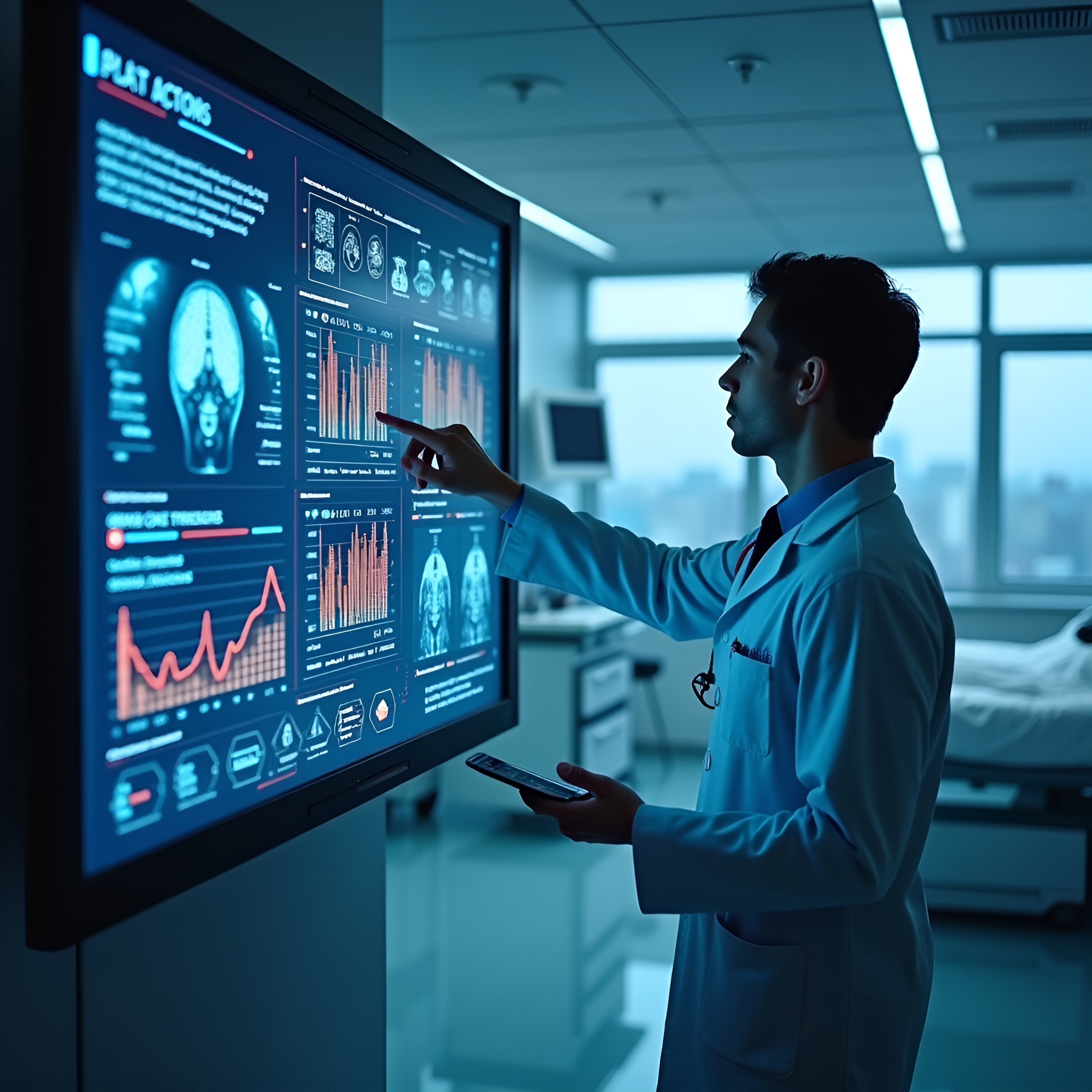How AI is Revolutionizing Decision-Making in Healthcare
In today’s fast-evolving healthcare landscape, doctors face unprecedented challenges. The rapid expansion of medical knowledge, combined with rising patient demands, has made it increasingly difficult to make fast, data-informed decisions that ensure the best patient outcomes. Enter artificial intelligence (AI): a powerful tool that’s transforming healthcare by analyzing data with accuracy and efficiency that surpasses human capabilities.
With AI’s support, healthcare professionals can now make more informed decisions, faster, and with greater confidence. Dr. Karen DeSalvo, Google’s Chief Health Officer, describes AI’s potential as “akin to the discovery of penicillin,” suggesting that if thoughtfully developed, AI could significantly advance health equity worldwide .
This article explores how AI-analyzed data is assisting doctors, from diagnostics to patient management, and how this technology promises a brighter, more efficient future for healthcare.
“akin to the discovery of penicillin,”
Dr. Karen DeSalvo
Enhancing Diagnostic Precision
One of the most promising applications of AI in healthcare is in diagnostics. The process of interpreting medical data—whether in the form of lab results, imaging scans, or patient records—requires both accuracy and speed. Traditionally, doctors relied solely on their expertise and experience. But now, AI-powered systems can analyze vast amounts of data in seconds, flagging anomalies and suggesting diagnoses based on patterns that even experienced doctors might miss.
At Mount Sinai, AI algorithms are deployed to monitor high-risk patients in real-time, sending alerts to healthcare provid
ers if a patient’s health declines. This proactive approach allows for quicker intervention, helping to avoid severe outcomes and reduce unnecessary hospitalizations . Through initiatives like this, AI assists in providing life-saving insights, serving as a second set of “eyes” for doctors and enhancing the precision of diagnostics.
AI-Driven Decision Support Systems (CDSS)
AI’s utility goes beyond diagnostics, extending into real-time decision support systems. Known as Clinical Decision Support Systems (CDSS), these AI tools act as intelligent assistants, analyzing data from medical records, clinical guidelines, and recent studies to recommend the best course of action based on current patient information. Doctors don’t simply replace their expertise with AI recommendations; instead, they combine their insights with AI’s to ensure more comprehensive care.
As Dr. DeSalvo highlights, AI has the potential to democratize healthcare by providing consistent, high-quality diagnostics to communities that may otherwise lack specialized medical expertise . This function is crucial in an age when healthcare resources vary widely between urban and rural areas. AI-powered CDSS empowers doctors everywhere to deliver care on par with leading medical centers, addressing a pressing issue in healthcare equity.
Usama Fayyad, executive director of Northeastern’s Institute for Experiential AI, underscores the collaborative nature of AI in clinical settings. “AI doesn’t replace doctors,” Fayyad says, “it enhances their ability to make informed decisions.” By offering data-driven insights, AI helps clinicians optimize treatment options, reducing the risk of misdiagnosis and making personalized care plans possible .
Improving Workflow Efficiency and Reducing Burnout
Beyond diagnostics, AI is transforming the administrative side of healthcare—a critical factor as doctors and staff face mounting administrative demands. Managing patient records, scheduling, billing, and reporting requires a significant amount of time, often diverting doctors from their primary focus: patient care. AI-driven solutions are streamlining these processes, allowing healthcare staff to focus more on direct patient interaction.
For instance, AI scheduling tools can predict patient demand, optimize appointments, and reduce the number of missed appointments by automatically sending reminders. This efficiency not only reduces costs but also improves patient satisfaction, as fewer resources are tied up in handling administrative bottlenecks. A streamlined workflow reduces staff burnout, which has become a major issue in healthcare. By relieving some of these burdens, AI allows doctors to spend more time doing what they do best—caring for patients.
Data-Driven Insights for Better Patient Outcomes
AI’s role in data analytics allows healthcare providers to draw insights from massive datasets, ranging from individual patient histories to population health trends. With AI-analyzed data, doctors can identify high-risk patients early, recommend preventive measures, and customize treatment plans.
At Mount Sinai, for example, AI-analyzed data provides critical insights for early intervention, particularly in cases where subtle signs of health deterioration might otherwise go unnoticed . When a doctor can rely on AI to track these indicators in real-time, they gain the ability to respond proactively, potentially avoiding serious complications.
Dr. DeSalvo’s perspective captures this shift well, as she envisions AI helping healthcare reach more people while ensuring equitable care. “AI’s real power lies in its ability to make healthcare more precise, accessible, and effective,” she states, emphasizing the need for AI solutions that prioritize broad impact and inclusivity .
A Look to the Future: AI as a Healthcare Partner
As AI technology continues to advance, so too does its potential to reshape healthcare in significant ways. With each new development, AI gets better at processing complex medical data, offering doctors an invaluable tool to keep pace with the demands of modern medicine.
The goal is not to replace healthcare professionals but to create a symbiotic relationship where AI supports their decision-making with real-time insights and data analysis. With AI’s assistance, doctors are empowered to make quicker, more accurate diagnoses, offer tailored treatments, and stay ahead of potential health risks for their patients.
AI-driven data solutions are still evolving, but they already hold the potential to make healthcare more efficient, equitable, and effective for communities everywhere.
Moving Healthcare Forward with AI
As Dr. Karen DeSalvo emphasizes, the journey to fully realizing AI’s potential in healthcare is only beginning, but the promise is monumental. By harnessing AI-analyzed data, healthcare providers can deliver higher quality care, reduce costs, and improve patient satisfaction, making the healthcare landscape more accessible and effective for all.
AI is more than just a tool—it’s a partner in the mission to improve healthcare. And with this partnership, doctors are better equipped than ever to make decisions that change lives.
Sources:
1.Dr. Karen DeSalvo on AI’s Potential in Healthcare
Dr. Karen DeSalvo, Google’s Chief Health Officer, has emphasized AI’s transformative potential, comparing it to the discovery of penicillin. She discusses how AI, when developed responsibly, can greatly advance health equity and improve outcomes globally.
2.Google’s Vision for AI in Delivering Quality, Affordable Healthcare
In an article from Gulf Times, Dr. DeSalvo outlines how AI and large language models (LLMs) can help democratize healthcare, making quality care more accessible and affordable for people worldwide.
Access the full article on Gulf Times
3.Bizz Buzz’s Coverage on AI and Health Equity
Dr. DeSalvo highlights specific AI applications in healthcare, from mental health resources to advanced cancer screenings, underscoring AI’s potential to bridge gaps in healthcare accessibility and quality.


